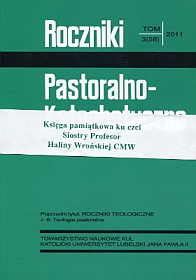What and for-whom is Happiness?
Abstract
Happiness is the subject of consideration in many branches of study. Starting from literature and books of the Bible, and going to the area of theology and philosophy, and especially philosophical anthropology and ethics, as well as humanities, such as psychology, pedagogy and others – we encounter various interpretations of it.
The deliberations contained in the present article have been situated on the area of philosophical anthropology, that is metaphysics of man, which means that for this type of analysis it is necessary to connect them with a realistic understanding of man, who, being a personal being, consisting of soul and body, is a manifold potentiality that he actualizes by his autonomous – free and conscious – activities.
In the analyses the reader’s attention has been called to the fact that the fulfillment of man’s personal life is a result of various human activities, including scientific-cognitive ones, undertaken in various research areas. For this reason the one gets happiness who tries to be fulfilled as a man: in his cognitive life – discovering the Ultimate Truth; in his emotional life – being united in love with the Supreme Good, and in his contemplative examination – clinging to the Supreme Beauty.
Presentation of these problems is preceded with citing the main trends in explaining the issue of happiness that we encounter in philosophy.
References
Arystoteles: Zachęta do filozofii. Tł. K. Leśniak. Warszawa1988.
Krąpiec M.A.: Szczęście. W: Powszechna encyklopedia filozofii. Red. nacz. A. Maryniarczyk. T. 9. Lublin 2008 s. 299-300.
Krąpiec M.A.: Metafizyka. Lublin 1984.
Locke J.: An Essay Concerning Human Understanding. Ed. P.H. Nidditch. Oxford 1990.
S. Thomae Aquinatis In Metaphysicam Aristotelis Commentaria. Taurini 1935.
S. Thomae Aquinatis Summa theologiae. Cura et studio P. Caramello. [Vol. 1]. Taurini 1963. (Tekst polski w tłumaczeniu F. Bednarskiego, wyd. Londyn 1963).
Tatarkiewicz W.: O szczęściu. Warszawa 1962(3).

